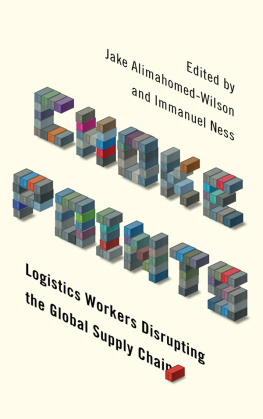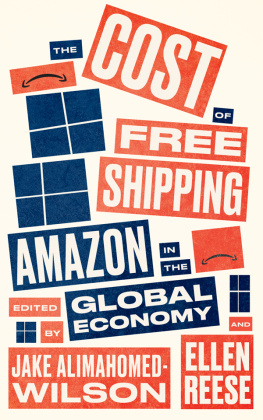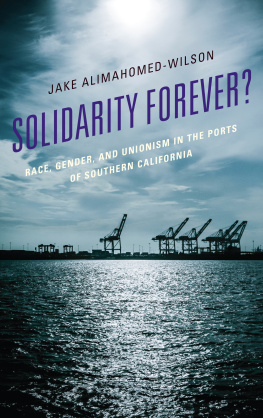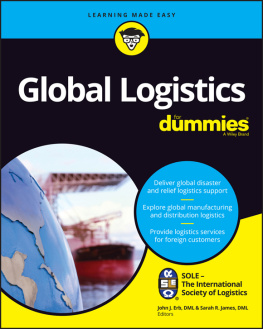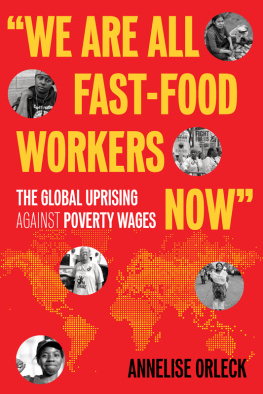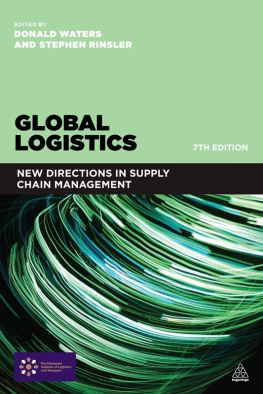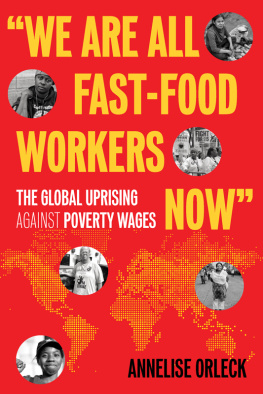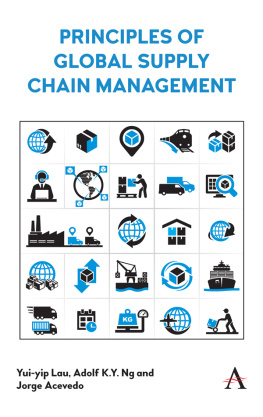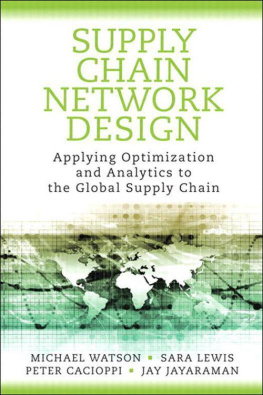Contents
Guide
CHOKE POINTS
Wildcat: Workers Movements and Global Capitalism
Series Editors:
Immanuel Ness (City University of New York)
Peter Cole (Western Illinois University)
Raquel Varela (Instituto de Histria Contempornea (IHC) of Universidade Nova de Lisboa, Lisbon New University)
Tim Pringle (SOAS, University of London)
Peter Alexander (University of Johannesburg)
Malehoko Tshoaedi (University of Pretoria)
Workers movements are a common and recurring feature in contemporary capitalism. The same militancy that inspired the mass labor movements of the twentieth century continues to define worker struggles that proliferate throughout the world today.
For more than a century, labour unions have mobilized to represent the political-economic interests of workers by uncovering the abuses of capitalism, establishing wage standards, improving oppressive working conditions, and bargaining with employers and the state. Since the 1970s, organized labour has declined in size and influence as the global power and influence of capital has expanded dramatically. The world over, existing unions are in a condition of fracture and turbulence in response to neoliberalism, financialization, and the reappearance of rapacious forms of imperialism. New and modernized unions are adapting to conditions and creating class-conscious workers movement rooted in militancy and solidarity. Ironically, while the power of organized labour contracts, working-class militancy and resistance persists and is growing in the Global South.
Wildcat publishes ambitious and innovative works on the history and political economy of workers movements, and is a forum for debate on pivotal movements and labor struggles. The series applies a broad definition of the labor movement to include workers in and out of unions, and seeks works that examine proletarianization and class formation; mass production; gender, affective and reproductive labor; imperialism and workers; syndicalism and independent unions, and labor and Leftist social and political movements.
Also available:
Just Work? Migrant Workers Struggles Today
Edited by Aziz Choudry and Mondli Hlatshwayo
Wobblies of the World: A Global History of the IWW
Edited by Peter Cole, David Struthers and Kenyon Zimmer
Southern Insurgency: The Coming of the Global Working Class
Immanuel Ness
The Spirit of Marikana: The Rise of Insurgent Trade Unionism in South Africa
Luke Sinwell with Siphiwe Mbatha
Working the Phones: Control and Resistance in Call Centres
Jamie Woodcock
Choke Points
Logistics Workers Disrupting the Global Supply Chain
Edited by Jake Alimahomed-Wilson and Immanuel Ness

First published 2018 by Pluto Press
345 Archway Road, London N6 5AA
www.plutobooks.com
Copyright Jake Alimahomed-Wilson and Immanuel Ness 2018
The right of the individual contributors to be identified as the authors of this work has been asserted by them in accordance with the Copyright, Designs and Patents Act 1988.
British Library Cataloguing in Publication Data
A catalogue record for this book is available from the British Library
ISBN 978 0 7453 3725 8 Hardback
ISBN 978 0 7453 3724 1 Paperback
ISBN 978 1 7868 0190 6 PDF eBook
ISBN 978 1 7868 0235 4 Kindle eBook
ISBN 978 1 7868 0234 7 EPUB eBook
This book is printed on paper suitable for recycling and made from fully managed and sustained forest sources. Logging, pulping and manufacturing processes are expected to conform to the environmental standards of the country of origin.
Typeset by Curran Publishing Services
Simultaneously printed in the United Kingdom and United States of America
Contents
Jake Alimahomed-Wilson and Immanuel Ness
Elizabeth A. Sowers, Paul S. Ciccantell, and David A. Smith
Andrea Bottalico
Peter Cole
Bai Ruixue and Au Loong Yu
Ellen Reese and Jason Struna
Amazon workers and supporters
Jake Alimahomed-Wilson and Spencer Louis Potiker
Johnson Abhishek Minz
Dimitris Parsanoglou and Carolin Philipp
Jorge Budrovich Sez and Hernn Cuevas Valenzuela
aatay Edgcan ahin and Pekin Bengisu Tepe
Abu Mufakhir, Alfian Alayubby Pelu, and Fahmi Panimbang
Sheheryar Kaoosji
Carlotta Benvegn and Niccol Cuppini
Peter Olney
Introduction:
Forging Workers Resistance Across the Global Supply Chain
Jake Alimahomed-Wilson and Immanuel Ness
The shipping container, or box, has become one of the most recognizable symbols of modern global capitalism.
Today, there are over 20 million shipping containers scattered around the world. On any given day, approximately 6 million of these containers are circulating the global supply chain on massive container ships, moving in and out of the worlds ports, or on trucks and trains. Despite the fact that the ubiquitous shipping container has become a mainstay on our roads and highways, most people rarely ever think about the workers who move these containers across the global supply chain. Although containers are seemingly everywherehiding in plain sightthey remain an enigma for most consumers, and in some sense obscure the economic and power relationships inherent in global capitalism. Despite the increase of interest in logistics by academics, the stories and struggles of logistics workers remains an understudied component of logistics in contemporary capitalism.
Who moves the goods?
The vast majority of industrial production relies on the hyper-exploitation of manufacturing workers in the Global South. From there, seafarers (the workers on the giant shipping vessels) ensure the movement of the container over thousands of miles across the worlds oceans en route to their destination port. This work is very dangerous for millions of seafarers in the world. The vast majority of these logistics workers are men from the Global South. Upon arrival at a port, the container will once again be offloaded from the ship by longshore workers, and typically placed on either a truck or train, before heading to a warehouse or distribution center, where the goods are processed and sorted by warehouse workers, then sent back out to retail stores via truck, or increasingly sent directly to a consumers home by a third party logistics provider thanks to e-commerce. So before a product arrives at a retail store, or appears on a persons front doorstep from an e-retailer, that product touches the hands of numerous transportation and logistics workers. It is precisely these invisible workers that this volume seeks to make visible by placing their struggles at the center of our analysis.
The strategic location of logistics labor
So who are the worlds logistics workers? Typically, they are longshore workers (dockworkers), warehouse and distribution center workers, seafarers, railroad workers, and truckers (both port truckers and long haul). Collectively, these workers represent a key group of laborers who are on the front lines of critical workers struggles around the world. Logistics workers are uniquely positioned in the global capitalist system. Their places of work are also in the worlds choke pointscritical nodes in the global capitalist supply chainwhich, if organized by workers and labor, provide a key challenge to capitalisms reliance on the smooth circulation of capital. In other words, logistics remains a crucial site for increasing working-class power today.

